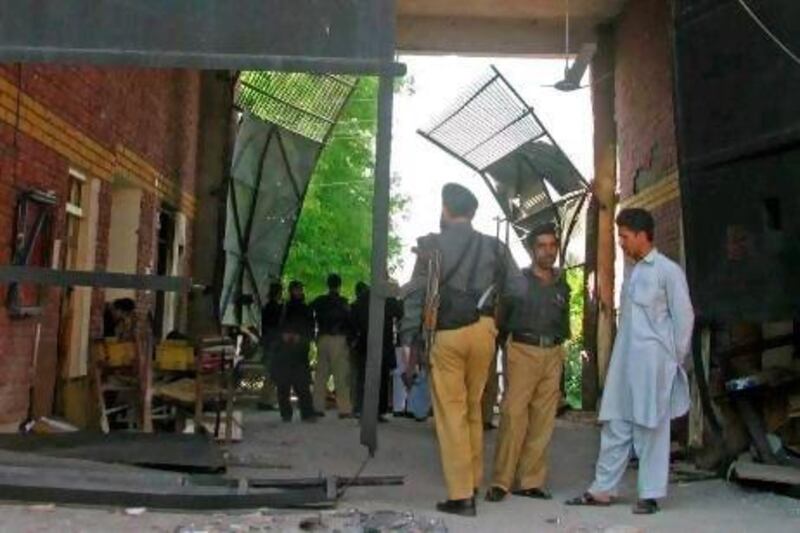ISLAMABAD // Nearly 400 prisoners including militants escaped from a jail in north-western Pakistan yesterday after an attack by insurgents armed with guns, grenades and rockets, officials said.
More than 150 armed Islamist militants stormed the prison outside the town of Bannu bordering the tribal regions where Taliban and Al Qaeda-linked fighters are known to operate.
Ehsanullah Ehsan, spokesman for the Pakistan Taliban, claimed responsibility for the attack.
"We attacked the Bannu prison and got our special members freed," Mr Ehsan said. "In a couple of days when all of them have reached their designated places, we will issue details about them."
A few "dangerous terrorists", including one wanted over an assassination attempt on the former ruler of Pakistan, Pervez Musharraf, were among 380 prisoners who fled during the attack which lasted for about two hours.
Local officials said that after the militants stormed into the prison, they went straight to the area where prisoners on death-row were locked and freed them.
"It's a very alarming and dangerous development," said Imtiaz Gul, a security analyst.
The militants blocked all roads leading to the prison to delay the arrival of any reinforcements and targeted six barracks where "dangerous insurgents" were being kept, said the information minister for Khyber Pakhtunkhwa province, Mian Iftikhar Hussain. Three policemen were injured in the fight.
Security forces cordoned off the area and arrested some of the escapees, while others returned voluntarily saying they had fled to avoid the gunfire, Mr Hussain said.
"We will investigate why militants were able to carry out such an attack successfully and what the security was doing," Mr Hussain said.
A large number of militants had recently been moved to the jail from neighbouring Kohat and Lakki Marwat prisons, which are being converted into centres to rehabilitate former insurgents, the security official said.
The United States has long demanded that Pakistan launch a military offensive in North Waziristan, the main base for the Haqqani network. That group has a reputation for being the most brutal of the Afghan factions fighting US-led forces across the border, but Pakistan has refused to do so, saying it's forces were tied down in fighting home-grown Islamist militants.
Pakistani military have launched offensives against militants in the north-west, destroying many of their strongholds and killing thousands of insurgents. However, the militants have shown resilience and have waged a campaign of suicide and bomb attacks across the country.
Mr Gul said the Bannu attack was reminiscent of the assault on a major naval base last year by a handful of Islamic militants in Karachi and the one on the military headquarters in Rawalpindi in 2010.
The raid may raises questions about Pakistan's ability to contain a growing militancy.
Pakistan's performance in tackling an Al Qaeda-inspired insurgency has come under increasing international scrutiny after US forces killed Osama bin Laden last year in Abbottabad.
Though Pakistan described the presence of bin Laden, who is believed to have lived nine years in Pakistan after fleeing the US-led invasion on Afghanistan in 2001, as a security lapse, questions were raised about Pakistan's reliability as a partner in the war on terror.
"It is the third biggest militant attack in Pakistan in recent years. It must invite introspection by the security establishment into security arrangements for all important installations … It raises questions about the security arrangements and intelligence capability in Pakistan," Mr Gul said.





